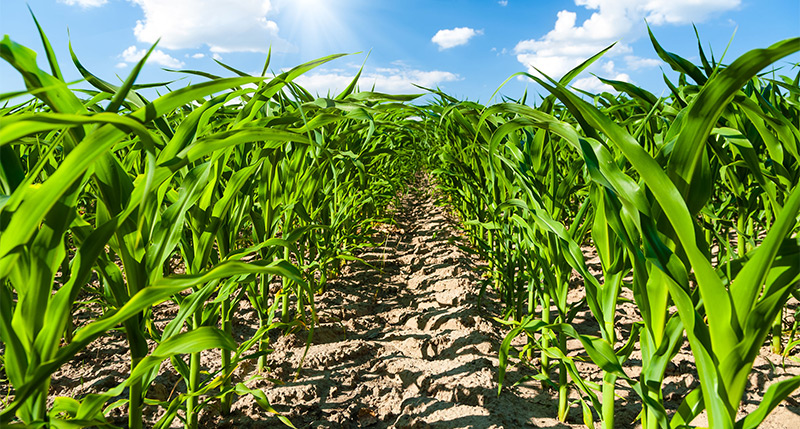How to Lower Your Intake of the Cancer-Causing Chemical Glyphosate
For the past 40 years, Roundup (and other weed killers with glyphosate as their main ingredient) has been promoted to farmers as the solution for weed control. Since hitting the market in 1974, glyphosate has become the number one herbicide used in commercial farming around the globe; over 1.8 million tons of this harsh chemical weed killer has been dumped on U.S. crops alone.
Many farmers who rely on the chemical for large agricultural operations are growing genetically engineered (GE) crops specifically designed to survive heavy herbicide use. Originally, GE seeds and plants were created to reduce the need for chemical applications by allowing farmers to spray for weeds without worrying about killing the plants.
However, much like the overuse of antibiotics has led to antibiotic-resistant superbugs, dousing fields with weed killer has led to an upsurge of hard-to-kill weeds. That means even more glyphosate is sprayed on crop fields in an attempt to control weed growth. And because glyphosate is a systemic chemical, it is absorbed into every cell of the plant, meaning the same chemical used to kill weeds ends up your dinner plate.
Beyond weed control, many conventional (non-organic) farmers also turn to glyphosate as a pre-harvest desiccant, for both genetically modified and traditional crops. Spraying the chemical on ready-to-harvest fields halts growth and dries the plants, loosening seeds to enable a quicker, easier harvest. While studies have questioned the effectiveness of this tactic, the larger issue is the chemicals left behind on the plants destined for consumption. Because of this pre-harvest spray technique, the animals ― including livestock and humans ― that eat these plants (some of which are non-GE) are also ingesting this harmful chemical.
The Tide Begins to Turn
In addition to the contaminating effects of commercial farming practices on our food supply, glyphosate is coming under fire for its toxic effects on those who work it. Many people who have been heavily exposed to Roundup in the course of their landscaping or agricultural jobs are now experiencing negative health effects. Numerous individuals have attempted to sue Monsanto, the company that produces both Roundup and the special GE seeds and plants designed to withstand glyphosate use ― but with no success. Then, in an unprecedented ruling in August 2018, school groundskeeper Dewayne Lee Johnson was awarded $289 million in damages in his lawsuit against the pesticide maker.
In the lawsuit, Johnson claimed his non-Hodgkin’s lymphoma cancer was the direct result of heavy Roundup exposure at work. Evidence in Johnson’s case clearly demonstrated that Monsanto knew their product caused this type of cancer and actively tried to hide the research that proved it.
Similar studies have shown that ingestion or contact with glyphosate causes numerous kinds of cancer, kidney and liver failure, endocrine disruptions, increased cellular toxicity, birth defects, immune system disruption, damaged DNA, and other health issues. As thousands of plaintiffs line up to sue Monsanto over life-threatening medical problems they claim stem from Roundup exposure, the tide may finally be turning.
What Conscious Consumers Choose
Since Roundup is most closely linked with the genetically modified organism (GMO) crops created to resist glyphosate ― most commonly soy and corn, though numerous other plants have also been genetically engineered in this way ― choosing to eat only non-GMO foods can reduce your glyphosate consumption. Unfortunately, pre-harvest spraying of non-GMO foods, especially grains, is also commonplace, so even non-GMO foods are often highly contaminated with glyphosate.
Though GMO foods are by far the most heavily contaminated, because glyphosate is absorbed into every cell of plants sprayed with it, scientists are pointing to the pre-harvest use of Roundup as the reason that virtually all foods tested today test positive for glyphosate. Since we consume these foods and thus unknowingly consume glyphosate, unhealthy amounts of the chemical have been found in everything from air samples and municipal water supplies to breast milk and urine. Even vaccines including the flu shot and pneumonia vaccine have tested positive for the chemical.
In today’s world, it seems impossible to completely avoid exposure to glyphosate, but as consumers, we have choices. There’s only one solution to clearing our air, water, and bodies of this toxic chemical: eating organic.
While organic foods may still contain trace amounts of glyphosate due to airborne herbicides drifting from nearby non-organic fields, organic food options are by far the cleanest and most sustainable choices available. Admittedly, it will take time to truly turn the tide, but every organic food purchase sends a clear message that contaminating our food and water for the sake of mass production is―in the eyes of U.S. consumers―unacceptable.

